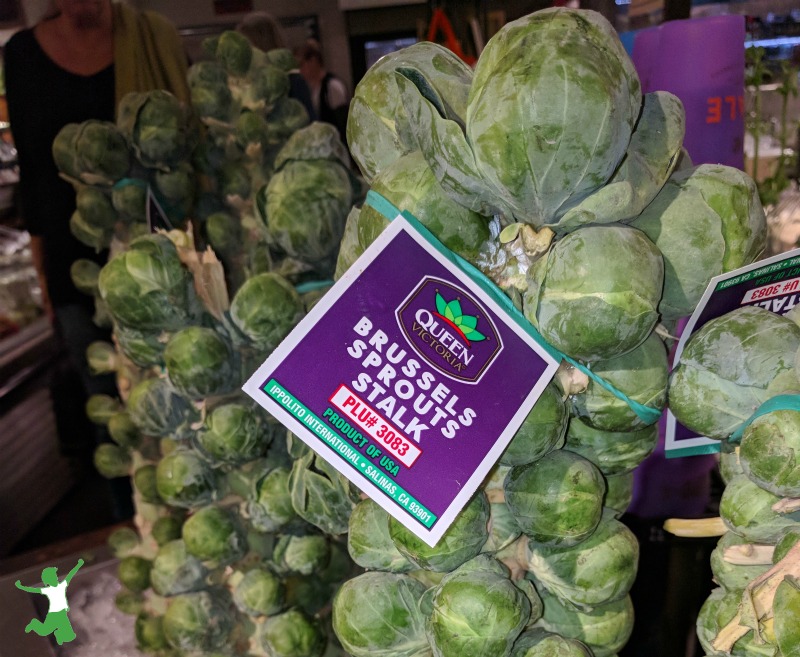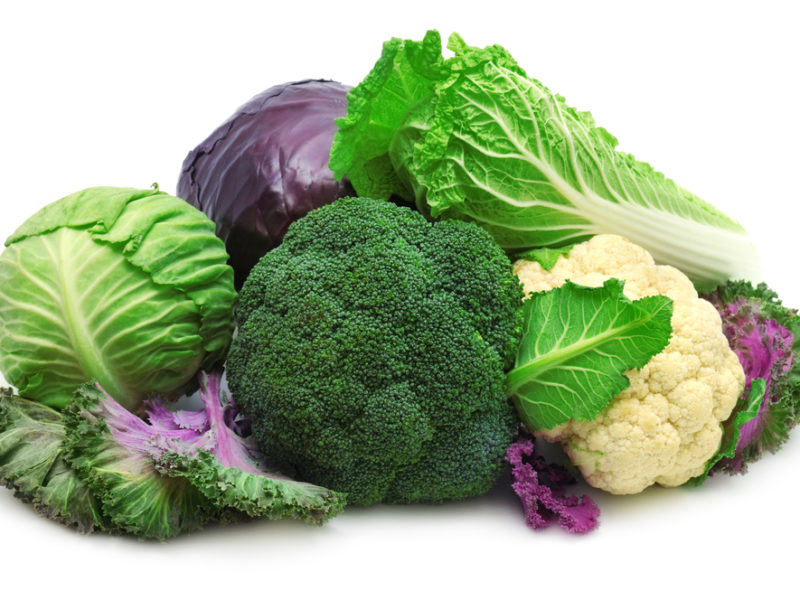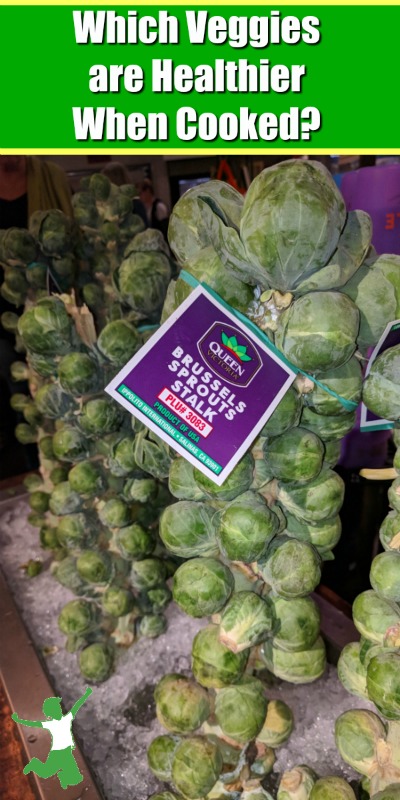Table of Contents[Hide][Show]
Conventional belief is that raw vegetables are always healthier than cooked, but this is not true depending on the plant foods eaten according to lab testing and anthropological evidence by experts in the field.
I stopped by one of my favorite healthfood stores today to pick up a large glass of fresh juice made from organic raw vegetables for an early lunch on the go. As usual, I asked for the a carrot, celery, beet, spinach and cucumber blend. But, hold the spinach. I definitely skipped the green smoothie too!
While this request is usually met with a simple nod by the juice bar attendant, this time the guy looks up and says, “Why no spinach? We have a lot of people that come in here and love the spinach in their juice.”
Ah! Great question!
The truth is that not everything should be eaten raw, especially vegetables!
Some raw vegetables must be cooked else you are actually harming yourself. Below is a rundown of what veggies should not be eaten raw either in whole or juiced form.
Cruciferous Raw Vegetables

Sorry to be the bearer of bad news, but cruciferous vegetables should be cooked before eating as they contain chemicals that BLOCK the production of thyroid hormone in your body! Considering that 2 out of every 3 Westerners are either overweight or obese and this is projected to jump to 75% by 2020, this is of particular importance as folks struggling with weight usually suffer from borderline to full-blown hypothyroidism.
Hypothyroidism is a condition where the thyroid gland does not make enough thyroid hormone, so someone suffering from this condition surely does not want to be eating foods that will block what little thyroid hormone is being produced in the first place!
Symptoms of hypothyroidism include cold hands and feet, thinning hair, fatigue, reduced or nonexistent libido, coarse dry hair, constipation, difficulty losing weight, and depression among many others.
Cooking crucifers reduces the goitrogenic substances by about 2/3. Fermentation does not reduce goitrogens in these veggies, but since fermented crucifers such as sauerkraut are typically eaten as a condiment and, hence, in small amounts, consumption is fine if the diet is rich in iodine.
Here is the list of common cruciferous vegetables that you do not want to be eating raw if you want to protect your thyroid gland!
Arugula, broccoli, kale, maca root, cauliflower, cabbage, turnip, collard greens, bok choy, brussels sprouts, radish, rutabaga, and watercress.
Notice that many of these vegetables are commonly included in fresh veggie juice blends or in salads. While an occasional arugula salad or cup of coleslaw is not going to do harm to most folks, it would be wise not to make a habit of eating/drinking any of these vegetables in raw form. Kale chips are a safe choice too.
Raw Vegetable Greens
Some veggie greens contain a chemical called oxalic acid. This substance is a very irritating to the mouth and intestinal tract. It also blocks iron and calcium absorption and may contribute to the formation of kidney stones.
The good news is that oxalic acid is reduced by a light steaming or cooking. Just be sure to discard the vegetable cooking water.
Veggies containing oxalic acid include spinach, chard, parsley, chives, purslane and beet greens.
Hmmmm. Spinach is known for being high in iron, yet eating it raw will not necessarily give you the iron you want because of the oxalic acid?
Yep, that’s right. Cook that spinach first if you are seeking an iron boost without the indigestion and don’t get hooked on the raw spinach salads!
Don’t stress about munching the parsley garnish on your next gourmet dinner, though. A little bit here and there is not going to cause a problem. Eat a big spinach salad everyday and it is virtually certain you will eventually succumb to kidney stones, according to Dr. William Shaw, Director of The Great Plains Laboratory for Health, Nutrition and Metabolism.
Other Raw Vegetable Cautions
Other vegetables that are best to avoid eating raw include:
- Raw potatoes contain hemagglutinins that disrupt red blood cell function.
- Raw sweet potatoes will give you gas.
- Raw, edible mushrooms such as the common white mushroom contain toxic substances such as agaritine, a suspected carcinogen. These substances are heat sensitive and are neutralized by cooking.
- Raw alfalfa sprouts are mildly toxic and inhibit the immune system. Eating large quantities regularly can make the skin overly sensitive to the sun or trigger autoimmune symptoms that mimic lupus.

Dr. Weston A. Price on Raw Vegetables
A good rule of thumb when considering the best way to consume your veggies is to remember the letter that Dr. Weston A. Price wrote to his nieces and nephews in 1934. In this letter, he strongly urged them to eat their vegetables cooked in butter. His research found that the bulkiness (fiber) of raw vegetables interfered with the human body’s ability to extract minerals from them via the digestive process.
So, should you drink your veggies raw? Of course. Raw vegetable juice made from veggies that are safe to consume uncooked is a wonderful way to get a fast infusion of easy to digest, colloidal minerals. It is also highly alkalizing to the body and a proven way to gently detox the gut.
The great thing about veggie juice is that the fiber is removed, which is the “bulkiness” that Dr. Price found interfered with the mineral absorption.
However, if you are going to eat the fibrous portion of the vegetable, it is best to cook them in butter as advised by Dr. Price to enhance the availability of the minerals. The fat in the butter permits greater absorption of the minerals, and besides, buttered veggies taste fantastic!
References
Nourishing Traditions
The Role of Oxalates in Chronic Disease, William Shaw PhD (Director of The Great Plains Laboratory for Health, Nutrition and Metabolism)
More Information
Best Green Juice for Congestion
Nightshade Vegetable Contraindications
Cleansing Myths








Unfortunately, Faith didn’t provide a way to reply to her comment. What I wanted to ask her was how long she and her family have been vegans. I have heard short-term vegan success stories, but not too many long-term.
I’m most definitely not supportive of vegan diets, especially not for children, but we can’t dismiss the benefits of a (very) short-term raw fast.
I wonder if they are some green leaf varieties that are low in oxalates and therefore suitable for salad.. any clue about this?
I struggle with chronic constipation caused by Celiac’s disease (I have been GF for 5 years). I have found that green smoothies help the most with it. This list knocks out all the greens I use for my smoothie! I also have hypothyroidism, which makes me extra worried about the cruciferous What greens do you recommend in order to get the fiber I seem to need without the added harm? Thanks!
I love fresh, home-grown, raw spinach. I can’t stand it cooked, even a little wilted – I just don’t like the taste, but love it crisp. I had never heard anything bad about eating it raw, so this is something totally new to me! I read somewhere that eating certain things with the spinach (protein, citrus, etc.) would neutralize this problem. I eat spinach most days for breakfast on my bean and egg burrito with bell peppers and salsa, on sandwiches for lunch and in a mixed green salad for dinner.
As for the increased kidney stones, I had the opposite experience. I have a propensity for kidney stones, used to get them almost every year (and they are INCREDIBLY painful, and there is nothing that can be done about them except live through it – childbirth was not that big of a deal in comparison). Since I’ve been on a healthier diet, including no caffeine, lots of water, healthier eating all around, and this eating spinach (when I never ate spinach before) I haven’t had a stone in more than two years. I know this is only anecdotal, but if anyone should get kidney stones from eating raw spinach, I think I would.
I love adding kale and spinach to soups – raw and letting them wilt from the heat or stir into quinoa with tomatoes again for a couple of minutes to wilt. Is this enough cooking or should I steam or saute them for a couple of minutes first?
Hi Sarah
Wow what alot of great info. What are your thoughts of wheatgrass juicing and eating sprouts like sunflower, brocilli, lentils etc.
I enjoy a shot of wheatgrass juice from time to time! 🙂 It’s quite high in sugar so best to not overdo. Sprouts of sunflower, lentils are wonderful foods to enjoy on a salad or whatnot but I would skip the broccoli sprouts for the reasons listed above in the post.
Hi All,
I know for me I didn’t know for years I had an Oxalate issue. I have had IC and Vaginits for over 18+ years in HORRIBLE Pain. No Doctor seemed to beable to help inthe first few years. I then Got rid of all the Specialist……. I went to school. I became an Iridologist under Dr. Jensen. I learned about nutrition. went to other Herbal classes in seattle, did all RAW foods which made me worse. I couldn’t figure it out I was cleaning,Raw food,Organic I did everything I learned!! 🙂 Still peeing Razor Blades and vaginal issues were bad, there would be few times they were good. So I figured it was how I had to live for the rest of my life in Horrible pain.
I am in good health. 5’5 120lbs never sick except Bladder and vaginal pain.
Over 3 years ago I learned about Oxalates in food. I had to turn all of my eating around. I found The Vp Foundation, ordered all there info. I then found the Low Oxalate Group, I started Low Oxalate Diet. in a week I noticed a differance in 3 weeks my bladder was 1/2 the pain. I then started taking calcium citrate before I ate……. WOW is all I can say. in 3 weeks all my pain was GONE!!!! I could sleep. I didn’t have to get up and pee 10x at night. I was so happy I cried. All the pain after all those years GONE!!!!
See I never knew I had an issue with Oxalates I am so glad I experimented and found out that is what all my pain was from. I am leading a great life! I have a NEW lease on life now 🙂
Hope this helps someone find there health 🙂
Thank you
Pam
Sarah
My nutritionist told me not to worry about the thyroid issue in juicing kale, chard, etc. as the amount is very small. In fact he has me doing a liver cleanse juice with comprises celery, beet greens, 1 beet, kale, and an apple. He is VERY knowledgeable and I totally trust him!
I agree that you cant avoid oxalates alltogether, its in practically all foods to one extent or another. The key is to avoid the REALLY high stuff like almonds, spinach, chard, rhubarb and a few others, consume the high and medium oxalate foods in small amounts that are offset with more low oxalate choices.
I love spinach, chard and almonds but I wont ever eat them again and certainly wont feed them to my child again. The potential nutirtional value is offset buy the poison they contain. Oxalic acid is basically what is used to flush radiators, and these foods have high amounts of it. We do however enjoy kale, macadamia nuts, pistachios and sunflower seeds in moderation and eat plenty of other healthy low oxalate greens like broccoli raab, collard, mustard, pea greens and cress. We dont lack for a variety of healthy food options and my family feels much better now that we’re watching our oxalate intake.